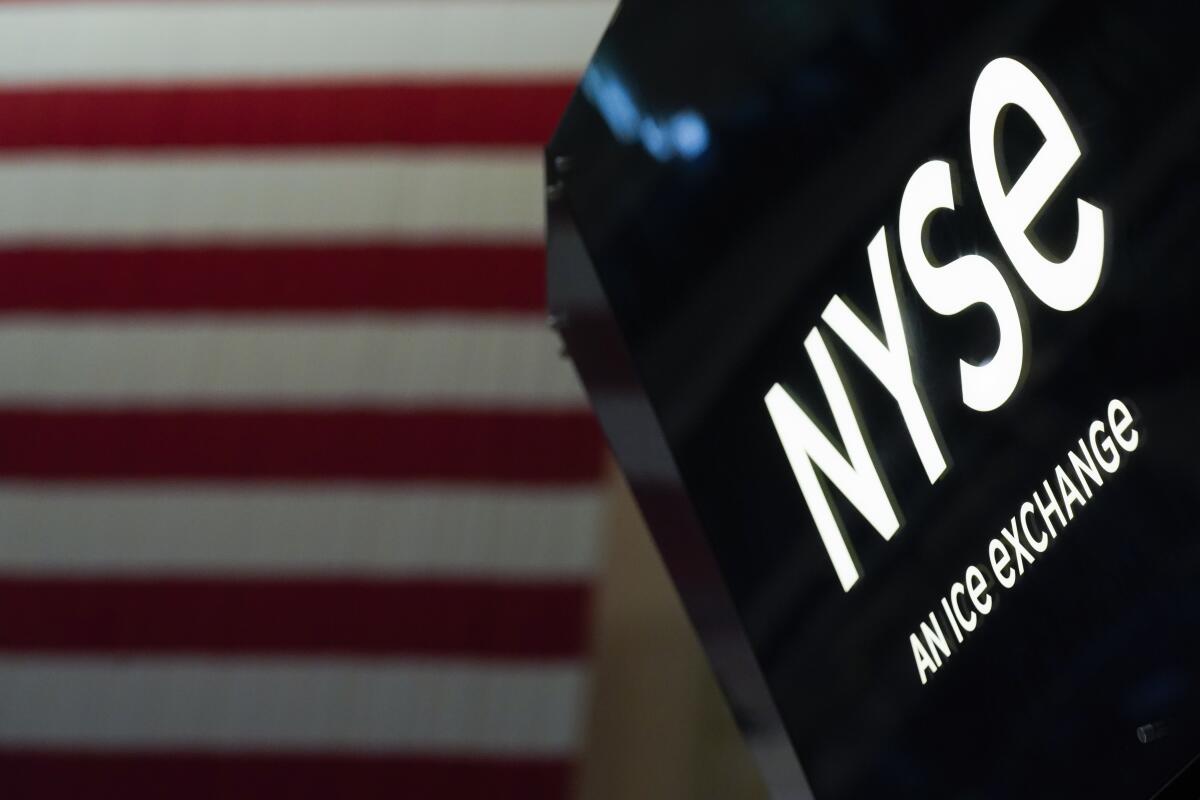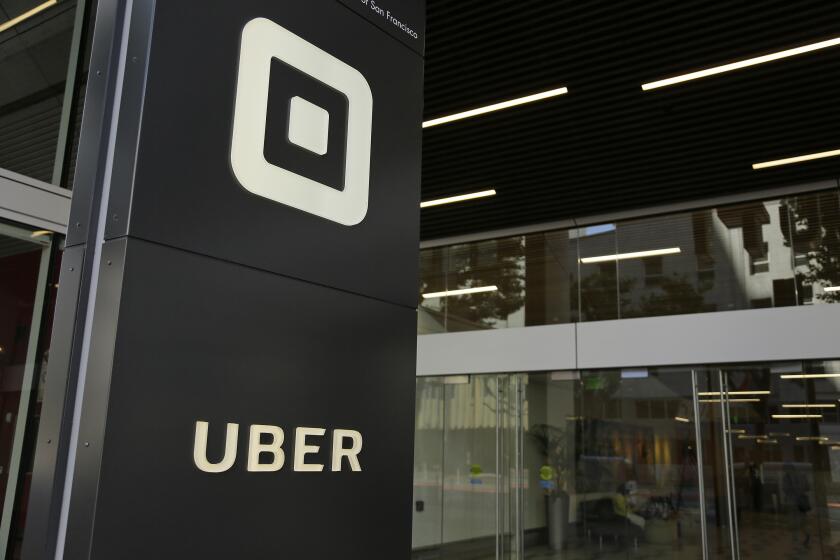Stocks tumble on economy fears after briefest of reprieves

- Share via
NEW YORK — Stocks tumbled Thursday on Wall Street as worries roared back to the fore that the world’s fragile economy may buckle under higher interest rates.
The Standard & Poor’s 500 index fell 3.3% in a widespread rout to more than reverse its blip of a 1.5% rally from a day before. Analysts had warned of more big swings given deep uncertainties about whether the Federal Reserve and other central banks can tiptoe the narrow path of hiking interest rates enough to get inflation under control but not so much that they cause a recession.
The Dow Jones industrial average lost 2.4% and was briefly down more than 900 points, while the Nasdaq composite sank 4.1%. It was the sixth loss for the S&P 500 in its last seven sessions, and all but 3% of the stocks in the index dropped.
Stocks on Wall Street fell along with stocks across Europe after central banks there followed up on the Federal Reserve’s big interest rate hike on Wednesday. The Bank of England raised its key rate for the fifth time since December, though it opted for a more modest increase of 0.25 of a percentage point instead of the 0.75-point hammer brought by the Fed.
A bill by Assemblymember Buffy Wicks that would have provided employee protections for working parents and caregivers in California fails.
Switzerland’s central bank, meanwhile, raised rates for the first time in years, a half-point hike. Taiwan’s central bank raised its key rate by an eighth of a point. Japan’s central bank began a two-day meeting, though it’s held out on raising rates and making other economy-slowing moves that investors call “hawkish.”
Such moves and expectations for plenty more have sent investments tumbling this year, from bonds to bitcoin. Higher interest rates slow the economy by design, in hopes of stamping out inflation. But they’re a blunt tool that can choke off the economy if used too aggressively.
“Another concern is that with the change in policy, there’s been weakening economic data already,” said Bill Northey, senior investment director at U.S. Bank Wealth Management. “That raises the odds of a recession in the latter part of 2022 into 2023.”
President Biden told the Associated Press on Thursday that he saw reasons for optimism about the economy and that a recession is “not inevitable.”
The state expanded its mortgage relief program to cover people who have missed payments in 2022, as well as homeowners with incomes up to 150% of their county’s median income level.
The worries dragged the S&P 500 into a bear market earlier this week, meaning it had dropped more than 20% from its peak. It’s now 23.6% below its record set early this year and back to where it was in late 2020. That in effect erases the gains during 2021, which was one of the best years for Wall Street since the turn of the millennium.
The S&P 500 fell 123.22 points to 3,666.77. The Dow lost 741.46 points to close at 29,927.07, and the Nasdaq dropped 453.06 points to 10,646.10. Thursday’s biggest losses hit the stocks of the smallest companies, a signal of pessimism about the economy’s strength. The Russell 2000 index of smaller-company stocks sank 81.30 points, or 4.7%, to 1,649.84.
Not only is the Federal Reserve hiking short-term rates, but it also this month began allowing some of the trillions of dollars of bonds it purchased through the pandemic to roll off its balance sheet. That should put upward pressure on longer-term interest rates. It’s another way central banks have been ripping away supports they earlier propped underneath markets to juice the economy.
The U.S. economy is still holding up, driven in particular by a strong jobs market. Fewer workers filed for unemployment benefits last week than a week before, a report showed Thursday. But more signs of trouble have been emerging.
On Thursday, one report showed home builders broke ground on fewer residences last month. Rising mortgage rates resulting directly from the Fed’s moves are digging into the industry. A separate reading on manufacturing in the mid-Atlantic region also unexpectedly fell.
“Corporate earnings estimates have not yet changed to reflect some of the softening economic data and that could lead to the second leg of this repricing,” Northey said.
Treasury yields swung sharply Thursday, with the 10-year yield down to 3.23% from 3.39% late Wednesday. It had climbed as high as 3.48% in the morning, near its highest level since 2011.
Higher rates have been delivering the hardest hits this year to the investments that soared the most through the easy, ultralow rates of earlier in the pandemic, which now look to be among the most expensive and risky investments. That includes bitcoin and high-growth technology stocks.
Big tech stocks were among the heaviest weights on the market Thursday, but the sharpest losses hit stocks whose profits depend more on the strength of the economy and whether customers can keep up their purchases amid the highest inflation in decades.
Cruise operators Norwegian Cruise Line Holdings, Royal Caribbean Group and Carnival all lost more than 11%.
It’s all a sharp turnaround from a day earlier, when stocks rallied immediately after the Fed’s biggest hike to rates since 1994. Analysts said investors seemed to latch on to a comment from Fed Chair Jerome H. Powell, who said mega-hikes of three-quarters of a percentage point would not be common.
Powell said Wednesday that the Fed was moving “expeditiously” to get rates closer to normal levels after last week’s stunning report that showed inflation at the consumer level unexpectedly accelerated last month, which dashed hopes that inflation may have already peaked.
The Fed is “not trying to induce a recession now, let’s be clear about that,” Powell said. He called Wednesday’s big increase “front-end loading.”
“Despite their assurance, it’s unclear to me whether the Fed has the tools they say they do to tamp down prices,” said Jason Brady, chief executive of Thornburg Investment Management. He also said that even after its mega-hike Wednesday, which was triple the usual amount, “the Fed is still behind.”
The Massachusetts high court has thrown out a ballot initiative by ride-hailing companies as greedy and deceptive.
AP business writers Damian J. Troise and Yuri Kageyama contributed.
More to Read
Inside the business of entertainment
The Wide Shot brings you news, analysis and insights on everything from streaming wars to production — and what it all means for the future.
You may occasionally receive promotional content from the Los Angeles Times.













